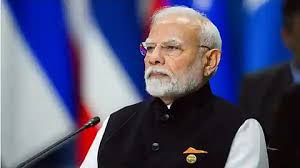Today in Politics: JD(U) to launch campaign on Bihar voter list revision, PM Modi in Namibia for final leg of diplomatic tour

India’s political landscape today featured two major developments. In Bihar, the JD(U) launched a state-wide campaign to support voter list revision. Meanwhile, Prime Minister Narendra Modi arrived in Namibia to conclude his five-nation diplomatic tour.
JD(U) Drives Voter Awareness in Bihar
The Janata Dal (United), led by Chief Minister Nitish Kumar, has begun a campaign for Bihar’s Special Intensive Revision (SIR) of electoral rolls. This revision involves house-to-house verification to update voter information. It aims to add eligible citizens and remove outdated or ineligible names.
The last time Bihar held such an exercise was in 2003. With elections scheduled for 2025, the timing of this update has become a hot topic. The JD(U) kicked off its awareness campaign with bike and cycle rallies across the state.
Why Is the Revision Happening Now?
Bihar’s Election Commission approved the SIR to ensure electoral accuracy. Officials will visit homes, verify documents, and help citizens fill forms. JD(U) claims the revision will strengthen democracy by improving transparency.
However, not everyone agrees.
Opposition Parties Raise Red Flags
Several opposition parties—including the RJD, Congress, DMK, and RLM—oppose the voter revision. They fear it could remove valid voters, especially those from poor or marginalized communities.
Leaders like Tejashwi Yadav and Farooq Abdullah have called the process biased. They believe the revision could benefit the ruling party by trimming opposition votes.
These parties took the matter to the Supreme Court. Although the court refused to stop the revision, it will hear the case again on July 10. That decision could shape Bihar’s political direction.
JD(U) Mobilizes Grassroots Support
JD(U) leaders have dismissed the opposition’s concerns. They argue that misinformation is misleading voters. According to JD(U) state president Umesh Kushwaha, the campaign is not political but civic.
Party workers, including women and youth leaders, are helping people fill out Forms 6, 7, and 8. These forms are required to add, correct, or delete voter details. The JD(U) says its mission is to empower citizens, not confuse them.
This initiative also helps the party gear up for the 2025 elections. By interacting directly with voters, JD(U) hopes to rebuild trust and secure grassroots support.
PM Modi in Namibia: Focus on Partnerships and Digital Diplomacy
While political debates heat up in Bihar, Prime Minister Narendra Modi is pursuing India’s global ambitions. He has reached Windhoek, Namibia, the final stop of his eight-day diplomatic tour.
The tour also covered Ghana, Trinidad and Tobago, Argentina, and Brazil. This marks one of Modi’s longest foreign visits since 2014. His agenda includes economic partnerships, energy security, and digital innovation.
Strategic Goals Behind the Tour
PM Modi’s visit to Namibia holds great significance. He is set to meet Namibia’s new President, Netumbo Nandi-Ndaitwah. The two leaders are expected to discuss mineral trade, technology, and payment systems.
India wants access to Namibia’s resources—uranium, lithium, cobalt, and diamonds. These minerals are crucial for energy, electronics, and clean tech.
In return, India plans to introduce its Unified Payments Interface (UPI) in Namibia. This move can strengthen economic ties and promote financial inclusion.
Why Namibia Matters to India
Namibia is rich in natural wealth. It also offers a gateway to Southern Africa. Partnering with Namibia can help India expand its influence in the region.
Moreover, the introduction of UPI gives India an edge. It shows India’s capacity to export digital tools, not just physical goods.
This approach supports India’s leadership in the Global South. By sharing technology, India builds goodwill and economic influence.
Key Takeaways
- JD(U) is actively supporting the voter list revision through ground-level campaigns.
- Opposition parties have challenged the move, calling it unfair and exclusionary.
- The Supreme Court will review the issue on July 10. Until then, the revision continues.
- PM Modi’s visit to Namibia focuses on trade, minerals, and digital cooperation.
- India’s diplomatic push aims to secure resources and expand fintech partnerships.
What Lies Ahead?
The Supreme Court’s verdict next week could alter the course of Bihar’s voter drive. If it halts the revision, opposition leaders may claim victory. If it allows the process to continue, JD(U) will likely intensify its campaign.
On the international front, the impact of PM Modi’s tour will unfold over the coming months. UPI partnerships, resource deals, and strategic diplomacy may offer long-term gains for India.
For now, India stands at a crossroads—revamping its democracy at home while reshaping its role abroad.






